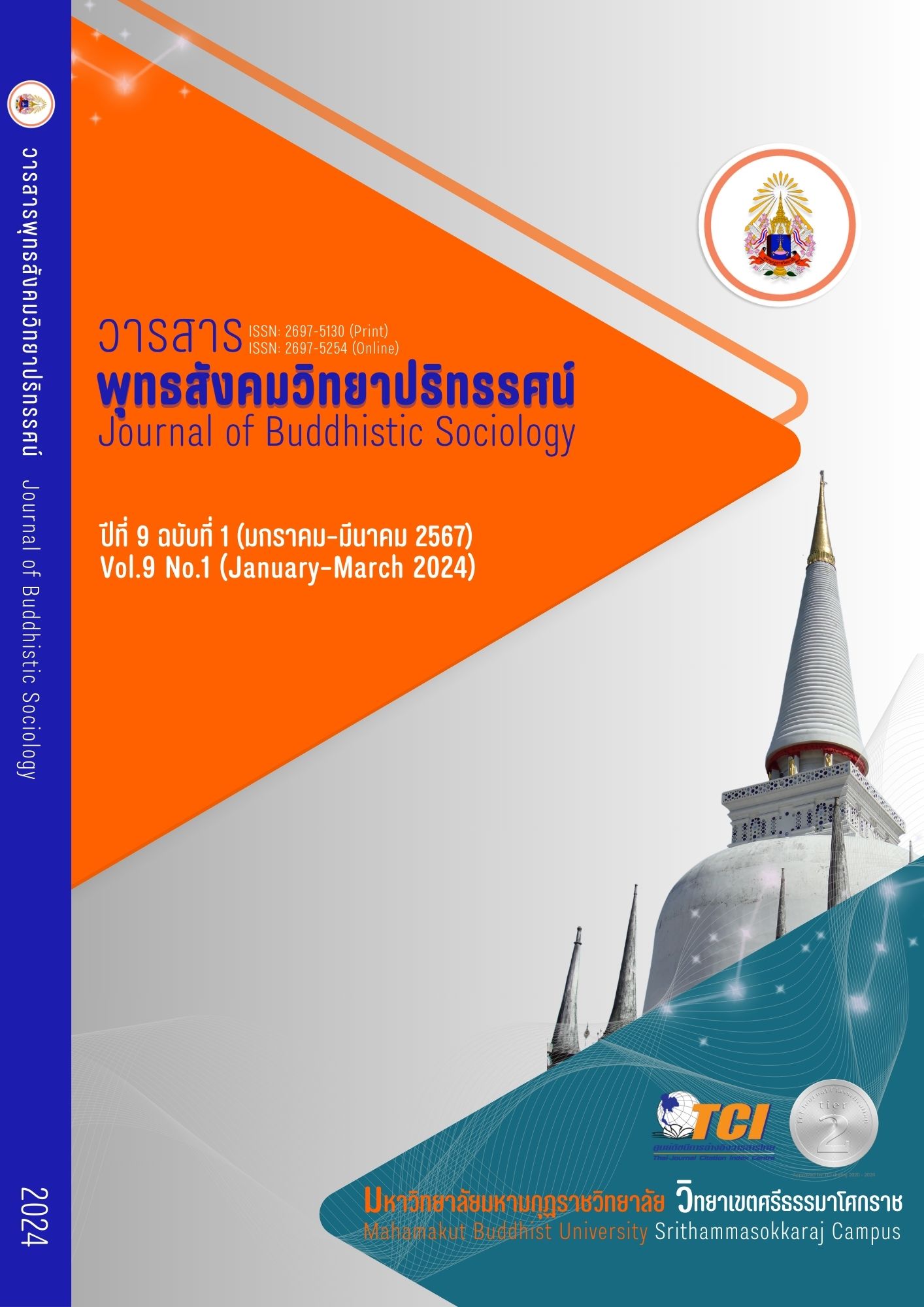DITTHADHAMMIKATTHA: BUDDHIST ECONOMICS TO IMPROVE THE QUALITY OF LIFE IN THE ERA OF CONSUMERISM
Main Article Content
Abstract
The principles of Ditthadhammikattha are the principles and philosophical principles of Buddhism. This is important to the development of the quality of life of individuals in an era where every aspect of prosperity, whether it be the economy, technology, transportation, etc., responds to human needs. Because humans are the ones who create their own desires or desires, which is called "consumerism" and is viewed as a good thing. It has become a step beyond morality and ethics. Which is the cause of suffering because he was dissatisfied with everything, he had By aiming to follow the progress of material things that are progressing slowly. Along with the increased desire, the psychological value deteriorated to the point of selfishness. Putting into practice the principles of Ditthadhammikattha helps build a strong mental foundation. and create happiness in life and helps develop skills in thinking, analyzing, and evaluating situations consciously. reduce selfishness in this article, the author's objectives are 1) to provide citizens with principles to adhere to by applying the teachings of Buddhism to their daily lives, and 2) to make them aware of society in the era of consumerism and live life consciously. Satisfied with everything that one has according to reality.
Therefore, awareness of good human morality and ethics and the happiness of society Reduce your desires by using a religious principle called “Ditthadhammikattha principle” is a principle that makes everyone feel compassionate. each other Not seeking profit or take advantage for comfort that satisfies one's own desires be kind to others Build good and friendly relationships with those around you. It allows us to fully give love and peace to others.
Article Details

This work is licensed under a Creative Commons Attribution-NonCommercial-NoDerivatives 4.0 International License.
References
ชลวิทย์ เจียรจิตต์. (2560). ศาสนากับการพัฒนา. นนทบุรี: ดีไซน์ ดีไลท์.
พระธรรมกิตติวงศ์ (ทองดี สุรเตโช). (2548). คำวัด. กรุงเทพมหานคร: เลี่ยงเซียง.
พระธรรมปิฎก (ป.อ.ปยุตฺโต). (2547). ธรรมนูญชีวิต (พิมพ์ครั้งที่ 2). กรุงเทพมหานคร: โรงพิมพ์การศาสนา.
พระธรรมปิฏก (ป.อ.ปยุตฺโต). (2545). ธรรมนูญชีวิต. กรุงเทพมหานคร: โรงพิมพ์กรมศาสนา.
พระมหาอภิพงค์ ภูริวฑฒโน (คำหงษา). (2566). เอกสารประกอบการสอนรายวิชาศาสนาเพื่อการพัฒนา. มหาวิทยาลัยมหามกุฏราขวิทยาลัย วิทยาเขตศรีล้านช้าง.
พระมหาอภิพงค์ ภูริวฑฺฒโน (คำหงษา). (2566). ระบบการสอนเศรษฐศาสตร์อิงหลักทิฏฐธัมมิกัตถะ เพื่อพัฒนาคุณลักษณะอันพึงประสงค์ในการดำรงชีพพอเพียง ของนักเรียนชั้นมัธยมศึกษาตอนต้น โรงเรียนพระปริยัติธรรมภาคตะวันออก: กรณีศึกษา โรงเรียนพระปริยัติธรรมวัดโสธรวราราม. ใน ครุศาสตรดุษฎีบัณฑิต สาขาวิชาการสอนสังคมศึกษา. มหาวิทยาลัยมหาจุฬาลงกรณราชวิทยาลัย.
มหาวิทยาลัยมหาจุฬาลงกรณราชวิทยาลัย. (2539). พระไตรปิฎกภาษาไทยฉบับมหาจุฬาลงกรณราชวิทยาลัย. กรุงเทพมหานคร: มหาจุฬาลงกรณราชวิทยาลัย.
สำราญ อิ่มจิตต์. (2547). เศรษฐปรัชญาในพุทธศาสนา. กรุงเทพมหานคร: ธนาเพรส.
Alexander H. Shand. (1990). Free Market Morality: The Political economy of the Austrian. London: Routledge.


